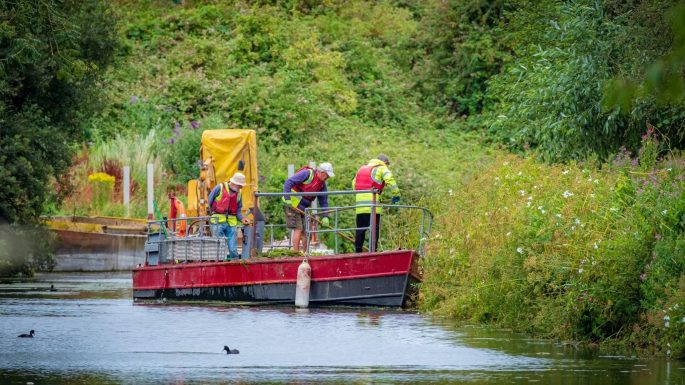Volunteers clear algae
A long spell of warm sunny days, weeks of torrential rain earlier in the year and the lack of boating activities are to blame for the green and porridge-like weed that has made its home in Chichester Canal.
In fact, it is not a weed at all, but an algae that has hit all slow moving waterways in England and on the continent. Its presence disrupts water borne activities and wildlife and significantly increases the silting up process.
A spokesman for Chichester Canal said: “The Covid-19 virus has also added to the problem as no boat movement brings clear water which in turn brings problems for the environment – believe it or not the murkier the water the less the weed grows.
“Even the ultrasound transmitters which have been installed around the Basin walls to prevent algae growth have been overcome by the speed of the weed. Quite apart from the cost, lack of power would prevent this remedy being installed further up the canal.
“Unfortunately, lockdown has also prevented the volunteer work party from any activity, including canal weeding, over the last three months.
“Sadly, during this period there has been a major growth in the blooming algae, one which now the work party cannot possibly keep up with.”

The good news is that work parties are now back in action but the first priority has been cutting back tow paths to assist social distancing. Weed removal also started in the Basin last week but within 24 hours new growth has appeared.
In the past, the ‘cow-catcher’ in the front of the tugboat has been used to gather the weed. However, at present, the tug can only cover a short distance before being overloaded and unable to reach a disposal point.
Meanwhile the tug and the Kingfisher boat (minus passengers) will make daily trips up the canal to try and maintain a channel through the weed for canoeists and paddle boarders.
At some point the algae will break down and nature will take its course. Volunteers are continuing to work hard to try and remove as much algae as possible to reduce the detrimental silting effect it will have on the canal when it rots and sinks.
